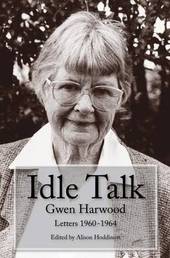
|
Idle Talk: Gwen Harwood, Letters 1960-1964
Paperback / softback
Main Details
| Title |
Idle Talk: Gwen Harwood, Letters 1960-1964
|
| Authors and Contributors |
Edited by Alison Hoddinott
|
| Physical Properties |
| Format:Paperback / softback | | Pages:200 | | Dimensions(mm): Height 234,Width 153 |
|
| Category/Genre | Literary studies - poetry and poets |
|---|
| ISBN/Barcode |
9781921556883
|
| Classifications | Dewey:822.914 |
|---|
| Audience | |
|---|
|
Publishing Details |
| Publisher |
Brandl & Schlesinger Pty Ltd
|
| Imprint |
Brandl & Schlesinger Pty Ltd
|
| Publication Date |
2 November 2015 |
| Publication Country |
Australia
|
Description
This volume, edited and with invaluable notes by Alison Hoddinott, comprises Gwen Harwood's fascinating, unexpurgated letters to Alison and Bill Hoddinott, during four crucial years, from 1960- 1964, a period which can be described as Harwood's creative floreat. They are also years in which her life-long relationships with A.D. Hope, James McAuley and Vincent Buckley begin, her friendships with Vivian and Sybille Smith and others consolidate, and in which Harwood was briefly notorious for her scandalous Bulletin acrostics and her confounding publication under several male pseudonyms. Approximately 10 percent of these letters have appeared already, in A Steady Storm of Correspondence (2001), but here we not only have the unedited versions, revealing even more than that volume the complex and not always kind and tactful personality of Harwood (who more than once urges the Hoddinotts to 'burn these letters'), but numerous others which it might have been felt unwise to publish earlier, and from which not everyone - even Harwood herself - emerges unscathed. The collection is rich in insights not only into Harwood's mind, working methods, and circle, but also into the literary politics of one of the key periods in modern Australian poetry. 'This book is a valuable contribution to literary and cultural history. It affords a fascinating glimpse into the mind and life behind the poems, providing rich insight into Harwood as a tour de force who astutely recognised her own gifts and demanded to be heard.' - Cordite
|